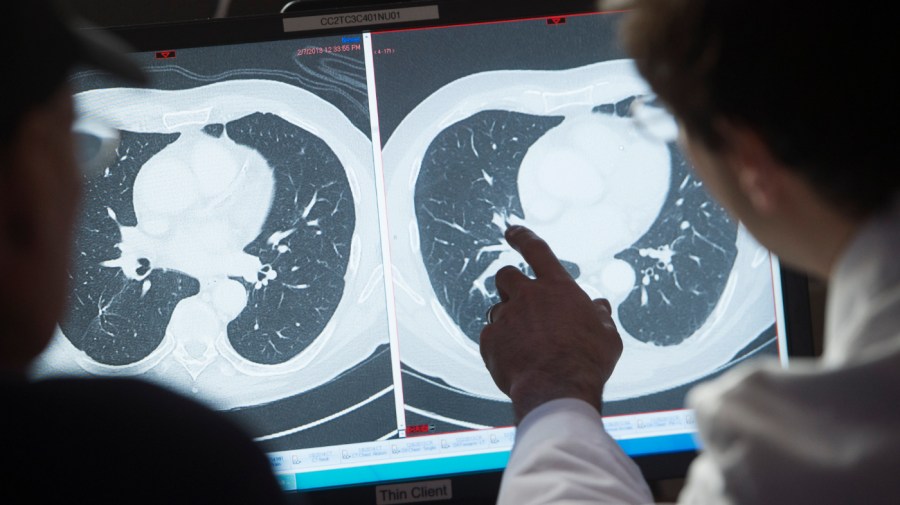
My longevity is imperiled by presidential actions taken recently to curtail research funded by the National Institutes of Health. Although I am only one individual affected by these unprecedented moves, my situation applies to millions of patients with cancer and other life-threatening diseases — from asthma and diabetes to cardiovascular disease and alcoholism — reliant upon NIH-funded research.
I am in the unlucky ranks of non-smoking women with lung cancer. My tumor was discovered 12 years ago by accident — an “incidental finding” — at Walter Reed Army Hospital when I was undergoing a CT scan for another reason.
If it hadn’t been found, I would have eventually begun coughing and experiencing shortness of breath and chest pain. Nobody would have suspected lung cancer, given my lifestyle and fitness level. In effect, I would most likely not be alive today to write this piece, had it not been for enhanced technology able to detect and characterize tiny tumors, thanks to NIH.
Three weeks later, a lobe of my lung was removed, and we hoped for a “surgical cure.” For the next four years, I felt healthy and fortunate that it was caught and acted upon early. But alas, during one of my routine six-month scans, new tumors were found in another lobe so more surgery ensued and, this time, chemotherapy, which was overseen at the NIH Clinical Center.
That isn’t the end of the story. Even now, tumors are forming in my remaining lobes. Their progression has been slow this time, and it hasn’t metastasized to other organs. So my oncology team is waiting.
Sounds ominous but I am reassured by their rationale, which is to wait for researchers, primarily funded by NIH, to develop new and more targeted treatments that offer a better chance of survival and fewer adverse effects. The field of lung cancer research is currently exploding, so it may be possible to save or at least prolong my life.
If, that is, the research is allowed to continue unimpeded. My life literally hangs in the balance.
Cause for concern are those actions taken within the first three weeks of this new administration. First, a freeze was placed on communications across NIH, which stalled research processes until a federal judge temporarily paused the freeze. In more recent days, billions of dollars were cut from NIH-funded research slated for universities and research centers to support the vital work of its investigators.
These are truly unprecedented moves, which have led to uncertainty about the future of this indispensable agency.
Ongoing assaults on the work supported by NIH will severely impede the continuity of this research and, in many cases, life-extending and saving discoveries. Particularly impacted are clinical trials designed to determine how best to treat deadly diseases, such as cancer.
Even a temporary pause could be devastating for people like me, desperately waiting for new treatments that are under development, being rigorously tested and on the verge of being adopted in clinical practice.
They can also lead to gaps in data collection that render results inconclusive or invalid. And because NIH (and other federal agencies facing cutbacks) routinely collects data to determine changes in prevalence rates of diseases, mental health disorders, substance abuse and other major problems, hampering tracking efforts would mean the public would never know the true consequences of these actions.
Fears are growing that these directives are a harbinger of a longer-term strategy to curtail NIH activities, which would lead to needless suffering and loss of lives.
Irrespective of the type or cause of a disease, patients rely on innovations in research and drug development to direct and assist in their journey. Any delays in progress by stalling grant-review processes, curtailing funding streams or disrupting the basic structure of NIH will interfere with its current operations, slow the momentum of scientific discovery and significantly set back the work of the National Cancer Institute and the other 26 NIH research centers focused on major diseases.
Congress has the awesome power to take effective action against these directives for the sake of millions of patients and their families. We urge you to act now.
Admittedly, I am concerned about my situation and the impact of this debilitating and potentially fatal disease on my family. But I also fear for all people, especially children, across the country afflicted with a serious disease. Nobody is immune.
Diana Fishbein, Ph.D. is a Nova Scholar and senior scientist at the Frank Porter Graham Child Development Institute at the University of North Carolina-Chapel Hill. She is also president of the National Prevention Science Coalition to Improve Lives and part-time research faculty at Penn State University.












